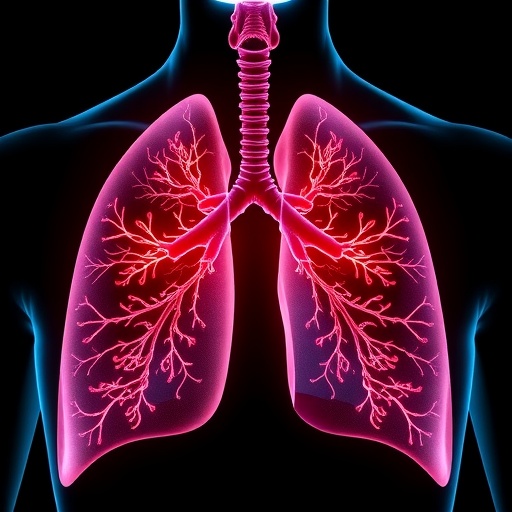In an illuminating advancement in the field of respiratory health, researchers have identified a novel biomarker, PIP4K2A, that exhibits a significant association with the decline in lung function among patients with Chronic Obstructive Pulmonary Disease (COPD). This discovery opens new avenues for understanding the complex mechanisms underlying COPD and emphasizes the pivotal role of immune responses in this prevalent lung condition. The study highlights the intricate relationship between CD8+ T cells and lung function, marking a substantial step in the identification of potential therapeutic targets.
COPD is a debilitating respiratory disease characterized by persistent airflow limitation, which typically worsens over time. The condition is often associated with exposure to noxious particles or gases, most commonly from smoking. Despite the known risk factors and the substantial burden on patients and healthcare systems alike, the biological mechanisms driving COPD progression remain poorly understood. As such, the search for reliable biomarkers that can predict disease progression and inform treatment strategies is of utmost importance.
The research team, led by notable scientists Huang, Lin, and Ke, undertook an exhaustive study to investigate the role of PIP4K2A in COPD. Their findings suggest that this biomarker, specifically linked to CD8+ T cells, holds significant promise for identifying individuals at risk of accelerated lung function decline. The research employed a rigorous methodology, analyzing samples from a diverse cohort of COPD patients to determine the expression levels of PIP4K2A and its correlation with clinical outcomes.
Results from the study indicated a marked increase in PIP4K2A expression in CD8+ T cells from patients experiencing rapid decline in lung function. This correlation suggests that PIP4K2A may serve as not only a marker for disease progression but also as a potential mediator of immune dysregulation in COPD. Importantly, the ability of PIP4K2A to influence CD8+ T cell function could pave the way for novel immunotherapeutic strategies aimed at modulating the immune response in COPD.
The findings further elucidate the complex role of CD8+ T cells in COPD pathology, highlighting their dual function as both effectors and regulators within the lung microenvironment. CD8+ T cells are traditionally recognized for their role in cytotoxic responses against pathogens; however, their activation and proliferation in COPD can lead to chronic inflammation and tissue damage. The research stresses the need for a nuanced understanding of these cells’ contributions to disease, particularly regarding how PIP4K2A could alter their behavior in the context of COPD.
Additionally, this discovery raises pertinent questions about the potential for targeting PIP4K2A as a therapeutic intervention. The notion that manipulating PIP4K2A expression or function could alter disease trajectories offers a tantalizing prospect for clinicians and researchers alike. Future investigations will undoubtedly delve into the molecular pathways associated with PIP4K2A, aimed at elucidating how it influences T cell activity and subsequently, lung function.
In the backdrop of such discoveries lies the pressing need for comprehensive clinical evaluations and trials to substantiate the utility of PIP4K2A as a biomarker and therapeutic target. Understanding the timing of PIP4K2A’s rise in relation to COPD disease progression will be critical in developing interventions that can effectively modify the disease course. This will involve collaboration across disciplines, including immunology, pulmonology, and pharmacology, to foster a multidisciplinary approach to COPD management.
Furthermore, the research draws attention to the broader implications of CD8+ T cell dynamics in chronic inflammatory diseases beyond COPD. By leveraging insights gained from this investigation, researchers may uncover new therapeutic targets applicable to other conditions characterized by immune dysregulation. The ability to harness the immune system to treat chronic diseases represents a paradigm shift in how we approach therapeutic strategies.
The ongoing efforts to validate and translate these findings into clinical practice will be instrumental. As momentum builds behind the identification of PIP4K2A as a significant player in lung function decline, researchers are encouraged to pursue longitudinal studies that explore its role across a wider spectrum of COPD stages. In doing so, they may uncover critical insights that could lead to early intervention strategies and improved patient outcomes.
In conclusion, the discovery of PIP4K2A as a biomarker associated with lung function decline in COPD represents a landmark achievement in respiratory disease research. Its connection with CD8+ T cells not only sheds light on existing mechanisms but also allows for the re-evaluation of therapeutic targets aimed at restoring immune balance within the lungs. Engaging with this research could transform the landscape of COPD management, bringing with it hope for new treatment modalities and improved quality of life for affected individuals.
This rigorous investigation underscores the necessity for continued exploration into the molecular underpinnings of COPD and related conditions. As researchers stand on the precipice of unveiling new frontiers in immunology and respiratory health, the insights gleaned from this study may reverberate across the medical community, catalyzing a wave of innovative approaches to combat chronic lung diseases.
The dynamic interplay between immune modulation and lung health emphasizes the urgency of integrating biomarker-based approaches into routine clinical practices. As the dialogue around PIP4K2A continues, the potential for personalized medicine tailored to the unique immunological profiles of COPD patients becomes increasingly viable. Ultimately, the drive to translate these findings from laboratory research to bedside applications presents an exciting frontier in the battle against COPD and similar respiratory ailments.
Subject of Research: Biomarker and Immunological Insights in COPD
Article Title: PIP4K2A: A Novel CD8+ T Cell-Related Biomarker Associated with Lung Function Decline in COPD
Article References:
Huang, S., Lin, S., Ke, J. et al. PIP4K2A: A Novel CD8+ T Cell-Related Biomarker Associated with Lung Function Decline in COPD.
Biochem Genet (2025). https://doi.org/10.1007/s10528-025-11274-1
Image Credits: AI Generated
DOI: https://doi.org/10.1007/s10528-025-11274-1
Keywords: COPD, PIP4K2A, CD8+ T cells, biomarker, lung function decline, immunotherapy, chronic inflammation.
Tags: biomarkers for COPDCD8+ T cells and respiratory healthChronic obstructive pulmonary disease researchCOPD disease progression mechanismsCOPD patient healthcare challengesimmune responses in COPDnovel discoveries in COPD treatmentpersistent airflow limitation in COPDPIP4K2A and lung functionrespiratory disease biomarkerssmoking-related lung declinetherapeutic targets for COPD





